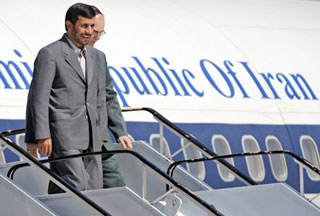
Iranian President Mahmoud Ahmadinejad is on his way to Latin America this week.
Obama’s appearance at the 5th Summit of the Americas in Trinidad and Tobago 2 weeks ago was largely viewed as a diplomatic coup. There, the American President reassured his neighbors to the south that the US wants to work as a productive “partner”. No discussion was brought up concerning China’s business ventures in Ecuador, Venezuela, Guyana, Brazil or Argentina (to name a few countries). Neither was Russia’s growing military contacts with Venezuela or Cuba mentioned. And certainly Obama and his delegation made no mention of Iran’s increased ties with Latin American leaders.
So it was with some surprise that the world reacted to US Secretary of State Hillary Clinton’s statement on Friday, that the Obama administration is working to increase ties with Latin American leaders so that Washington can counter Chinese, Iranian and Russian influence south of the US border. Clinton stated:
“If you look at gains, particularly in Latin America, that Iran is making and China is making, it is quite disturbing. They are building very strong economic and political connections with a lot of these leaders. I do not think that is in our interests.”
Clinton is stating what many see as obvious. It was under the Bush administration that the US lost a good deal of its political capital in Latin America due to Washington’s focus on the War on Terror and its lack of foreign aid and decreased FDI. Indeed, Venezuelan President Hugo Chavez also states the obvious: that if America wants to reengage with its southern neighbors, then it must also walk the walk… not only talk the talk.
However, some voices, particularly those in Iran, note an apparent schism in US rhetoric. Iranian Foreign Minister Manouchehr Mottaki reacted today by saying:
“Clinton’s statements are in direct contradiction to those of the US president. At a time when even Obama admits that decades of US interference and gunboat diplomacy in South America have led to so many unresolved issues, it does not make sense for Clinton to drag Iran into regional disputes.”
Mottaki’s statements come at a key moment, just before Iranian President Mahmoud Ahmadinejad is to travel to Latin America for a series of state visits. The Iranian press has reported that the US feels particularly anxious about Ahmadinejad’s visit to Brazil.
Regardless of what the actual strategy is for the US vis-a-vis its many Latin American neighbors, it continues to be evident that many rising powers, from China, to Russia, and also Iran, seek to create meaningful and lasting partnerships with